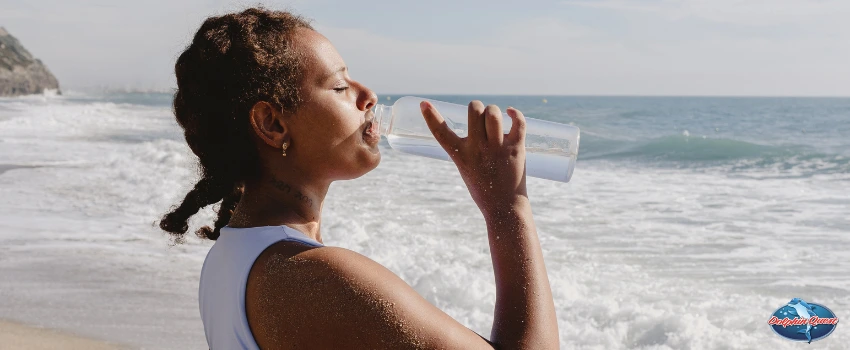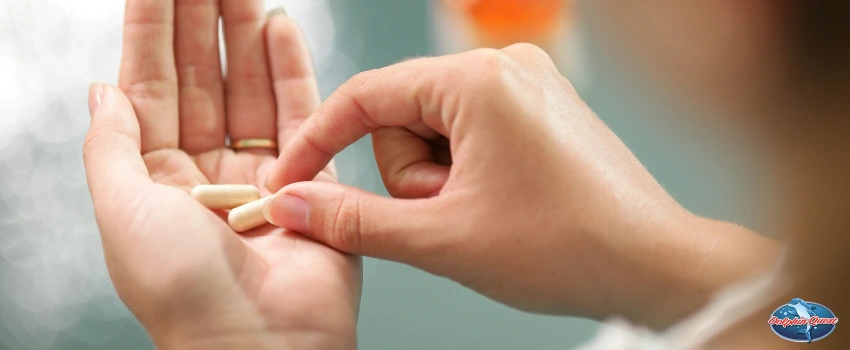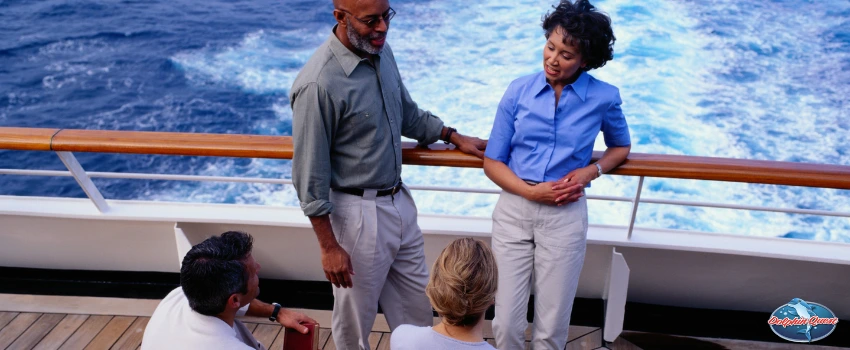The scourge of any voyage at sea is the dreaded seasickness. No one is safe from the motion of the ocean and seasickness can strike even the most sea-hardy sailors. By knowing how to prevent seasickness on a cruise, you can enjoy every moment on the high seas.
Cruise ship motion sickness, common though it is, can be mitigated by being prepared before setting foot on board your vessel. Let’s talk about the methods of how to not get seasick on a cruise in detail so that you can avoid a bad time at sea!
What is seasickness, exactly?

The effects are quite obvious: when the boat is rockin’, nausea can often come knockin’. What exactly causes this dire condition? Believe it or not, it’s often a matter of your own mind playing tricks on you.
Seasickness is caused by a sensory conflict between what your eyes see and what your inner ear, known as the vestibular system, senses. The inner ear is responsible for detecting motion and providing your brain with information about your body’s position and movement. Being in motion – and in particular, on a boat – causes the fluid in your inner ear to move. This tells your brain that you are in motion.
Where the problem arises is through your vision. If, for instance, you are looking at a stationary object while your body’s stability sensors are saying that you are moving, boom: that’s a recipe for seasickness.
Symptoms of seasickness include nausea, fatigue, sweating and a sudden headache. In other words, it’s not a pleasant experience. Some studies conducted suggest that up to 70% of people can or will experience seasickness on any given voyage. So, you’re not alone in your suffering.
Tips to Prevent Getting Seasick
Let’s go over steps on how to prevent seasickness on a cruise. Step one: finding the right vessel!
1. To prevent seasickness, size matters.
Though there is no best place to be on a cruise ship for motion sickness, the size of your vessel might make a difference. A larger boat such as a cruise ship or large catamaran often has stabilizers which prevent the rocking motion that contributes to seasickness.
For instance, large cruise lines rarely report instances of seasickness in anything but the roughest of seas. Meanwhile, smaller vessels may be affected by the wake of passing boats.
On smaller vessels, consider positioning. Sitting in the center can dramatically reduce the amount of rocking one will be subjected to. If the vessel has a center bench – such as on board a dolphin cruise, for instance – ask to be seated there if possible.
2. You are what you eat or don’t eat.

Considering a heaping plateful of fish ‘n chips before your cruise? Think again if you wish to stave off nausea from seasickness.
One of the first steps on how to avoid getting seasick on a cruise begins with choosing the right meal beforehand. Instead of that cowboy burger, opt for a light salad; rather than a few donuts, grab an apple. Filling your stomach with greasy or heavy foods can spell a recipe for disaster.
You’ve probably been told many times before, but drink more water! Dehydration can exacerbate the symptoms of seasickness. Unfortunately, alcohol and caffeine can worsen the symptoms.
So, if you’re susceptible, it’s best to avoid partaking (at least for the duration of your dolphin cruise or otherwise). The best method for how to not get seasick on a cruise begins with your very first meal of the day!
3. Consider your medicinal options.

In the battle of how to not get seasick on a cruise, victims often turn to the pharmacy for help. Many exist specifically to treat motion sickness, whether that be on a dolphin cruise, plane, or elsewhere. In any case, medicine can be a good choice for how to not get seasick on a cruise.
The most popular over-the-counter remedies are dimenhydrinate (Dramamine) or meclizine (Bonine). Dramamine is an antihistamine. During bouts of allergies or motion sickness, the brain releases histamine in response. Dramamine blocks the histamine receptors in the brain, thus alleviating the effects of motion sickness. Bonine acts in a similar manner using a different active ingredient known as meclizine.
For those seeking a more natural path to lessen the terror caused by motion sickness, there are many homeopathic remedies to choose from as well. Popular items purchased include accupressure wristbands and lozenges with ginger as a main ingredient. Ginger is known to settle an upset stomach and is a natural calming ingredient.
4. Focus on what’s ahead.
They say that staying busy can distract from what ails you. This advice may come in handy when considering how to avoid getting seasick on a cruise. There are a few tried and true methods you can utilize when the bubbling begins in your gut.
First, find the horizon as if you were Blackbeard on the hunt for treasure. Focusing on the horizon can help orient you, thus preventing the disassociation occurring between your eyes and ears. Reducing the sensation of motion by focusing on the horizon will give your brain time to catch up.
Second, though it may seem obvious, fresh air can help. If you’re on an open boat, try focusing on the horizon while taking slow but steady breaths of the ocean air. This can help to settle your stomach and is an easy way of how to not get seasick on a cruise.
5. Anxiety and seasickness are BFFs!

One thing a seasick stomach loves is anxiety. Being anxious can worsen the symptoms of motion sickness. Therefore, it can be a self-fulfilling prophecy before you depart for your dolphin cruise. Distract yourself by talking to your fellow passengers, crew members or even having an imaginary conversation with the dolphins themselves.
Listening to music and engaging in activities that activate the neurons can help your brain reconnect with your eyes and ears as well. Don’t go nuts, but do try to move around a bit if you can muster it.
Have a smooth-sailing adventure with Sunshine Scenic Tours!
While no one remedy is a cure-all for the dreaded seasickness, these tips can help prepare you before you board. Perhaps with this mind, you’ll feel more confident and thus alleviate the symptoms before they begin!
The Dolphin Quest, a thrilling dolphin cruise in John Pass, ensures a safe and unforgettable experience on the water. Our knowledgeable crew will teach you how to not get seasick on a cruise so you can enjoy smooth sailing and cherish every moment.











